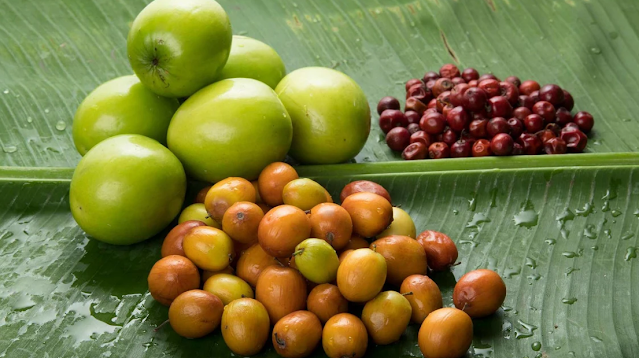Jujube, scientifically known as Ziziphus jujuba, is a fruit-bearing plant that has been widely used in traditional medicine for centuries. Revered for its potent health benefits, the jujube fruit is known for its wide array of nutrients and bioactive compounds that support various aspects of human well-being. In this article, we will explore the health benefits of jujube, its nutritional composition, its origin, and the countries where it is found.
What is Jujube?
Jujube is a small, round fruit that grows on the Ziziphus jujuba tree, a member of the Rhamnaceae family. The fruit is often red or brown when ripe and is known by various names such as “Chinese date” or “red date.” It is native to Southeast Asia, particularly China, but has since spread to other parts of the world. Jujube has a long history in traditional medicine, especially in Chinese and Ayurvedic practices, where it is utilized for its therapeutic properties.
Health Benefits of Jujube
Jujube is packed with a variety of bioactive compounds that offer numerous health benefits. Here are some of the key advantages of consuming jujube:
Rich in Antioxidants: Jujube fruits are a powerhouse of antioxidants, including flavonoids, polyphenols, and vitamin C. These compounds help neutralize free radicals in the body, which can reduce oxidative stress and lower the risk of chronic diseases such as cancer, heart disease, and neurodegenerative conditions.
Boosts Immune Function: Due to its high vitamin C content, jujube is an excellent immune booster. Vitamin C plays a critical role in enhancing the body's defense mechanisms, protecting against infections, and promoting wound healing.
Improves Digestive Health: Jujube is known for its ability to aid digestion. The fruit contains dietary fiber, which promotes regular bowel movements and supports a healthy gut microbiota. It can also help alleviate constipation and bloating.
Promotes Better Sleep: Traditionally, jujube has been used as a natural remedy for insomnia and anxiety. It contains compounds that have a calming effect on the nervous system, promoting relaxation and improving sleep quality.
Supports Heart Health: Regular consumption of jujube has been linked to improved cardiovascular health. The fruit contains compounds that help reduce blood pressure, lower cholesterol levels, and improve overall heart function, reducing the risk of heart disease.
Anti-Inflammatory Effects: Chronic inflammation is a major factor in many health conditions, including arthritis, diabetes, and heart disease. Jujube's natural anti-inflammatory compounds can help reduce inflammation and promote joint health.
Enhances Skin Health: The high vitamin C and antioxidant content in jujube is beneficial for maintaining healthy skin. These compounds help fight signs of aging by reducing wrinkles and promoting collagen production.
Supports Liver Health: Jujube is also considered beneficial for liver health. It has been traditionally used to detoxify the liver and improve its function, thus promoting overall well-being.
Nutritional Composition of Jujube
Jujube is a low-calorie fruit that provides a wide range of essential nutrients. Here is an overview of its nutritional composition per 100 grams:
- Calories: 79 kcal
- Carbohydrates: 21.4 g
- Fiber: 6.9 g
- Protein: 1.2 g
- Fat: 0.2 g
- Vitamin C: 69 mg (115% of the daily recommended intake)
- Potassium: 404 mg
- Iron: 0.8 mg
- Calcium: 18 mg
- Magnesium: 11 mg
Jujube is also a good source of B vitamins such as B6 (pyridoxine), which is essential for brain function and metabolism.
Where Does Jujube Come From?
Jujube is believed to have originated in China, where it has been cultivated for over 4,000 years. The fruit was initially used for medicinal purposes before becoming a common food item. Over time, jujube cultivation spread to other parts of Asia, including Korea, Japan, and India. It was later introduced to the Middle East, Europe, and eventually to the Americas.
Countries Where Jujube Is Found
Today, jujube is cultivated in several countries worldwide, particularly in regions with a warm climate. Some of the main countries where jujube is found include:
- China: As the birthplace of jujube, China remains the largest producer of this fruit, with extensive cultivation across the country.
- India: Jujube is grown in many regions of India, where it is popularly known as "Ber."
- South Korea: Jujube is widely consumed in South Korea, where it is used in both food and medicinal preparations.
- Iran: Jujube is cultivated in Iran, especially in regions with dry and temperate climates.
- Turkey: Turkey is another significant producer of jujube, where it is often used in traditional Turkish sweets and jams.
- United States: Jujube cultivation has increased in the United States, particularly in arid regions such as California and Texas.
Conclusion
Jujube is a fruit with a rich history and a wide range of health benefits. Its high antioxidant content, coupled with vitamins and minerals, makes it an excellent addition to a balanced diet. Whether you consume it fresh, dried, or in supplement form, jujube can support your immune system, improve digestion, enhance skin health, and much more. Grown in many countries across the world, this versatile fruit continues to gain recognition for its numerous medicinal properties.
Sources
- "Nutritional and Therapeutic Benefits of Jujube Fruit," Journal of Food Science and Technology, 2020.
- "Health Benefits of Jujube (Ziziphus jujuba) and Its Constituents," International Journal of Molecular Sciences, 2020.
- "Jujube: A Traditional Medicinal Plant and Its Modern Applications," Medicinal Plants and Extracts, 2019.






